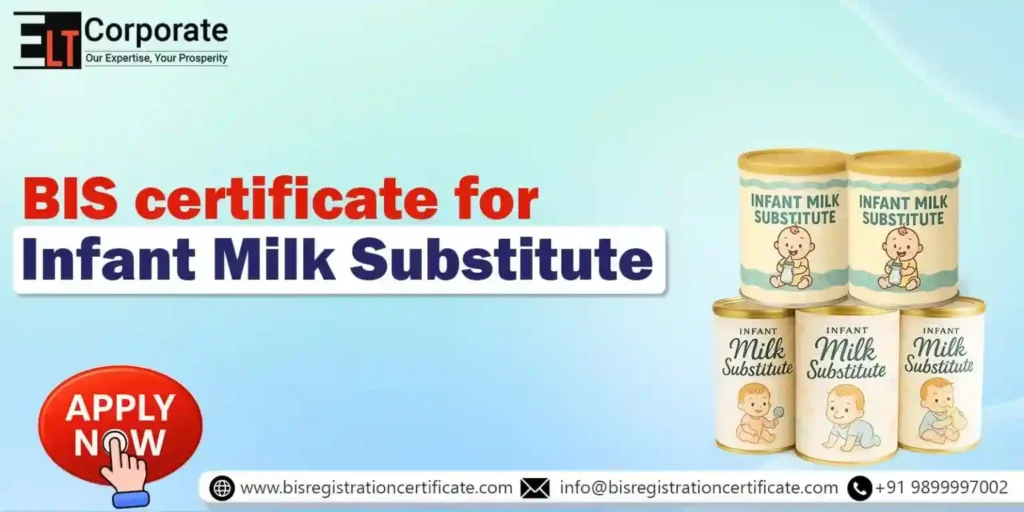Infant milk substitutes stand as vital nutritional products engineered to deliver balanced nourishment to infants who lack breastfeeding opportunities. Due to their sensitive nature and associated health risks from substandard products, the Indian government requires these products to meet strict safety and quality norms under the Bureau of Indian Standards (BIS). This article examines how to obtain BIS certification for infant milk substitutes by discussing relevant Indian Standards eligibility requirements, necessary documents, advantages and penalties for non-compliance. This guide offers manufacturers, importers and brand owners a simplified navigation through the certification process.
What is BIS Certification?
The Bureau of Indian Standards (BIS) is the national standards body of India, operating under the Ministry of Consumer Affairs, Food & Public Distribution. BIS certification is a quality assurance mechanism that confirms that a product complies with Indian Standards for safety, performance, and reliability. For products listed under Quality Control Orders (QCOs), BIS certification is mandatory. This includes infant milk substitutes, where consumer health and safety are of utmost concern.
Read More: Introduction To Bureau Of Indian Standards
Is BIS Certification for Infant Milk Substitutes Mandatory?
Yes, BIS certificate is compulsory for infant milk substitutes under the provisions of the Infant Milk Substitutes, Feeding Bottles and Infant Foods (Regulation of Production, Supply and Distribution) Act, 1992 and subsequent Quality Control Orders issued by the Ministry of Health & Family Welfare and the Ministry of Consumer Affairs.
Selling, manufacturing, storing, importing, or distributing infant milk substitutes without BIS certification is prohibited and punishable under law.
Applicable Indian Standard
The standard applicable for infant milk substitutes is:
- IS 14433:2022 – Infant Milk Substitutes – Specification
This standard outlines:
- Nutritional composition
- Microbiological safety
- Physical and chemical requirements
- Labelling and packaging standards
It ensures that infant milk substitutes provide safe, hygienic, and nutritionally adequate alternatives to breastfeeding, particularly in cases where breastfeeding is not possible.
Who Needs BIS certificate for Infant Milk Substitute?
The following stakeholders must obtain BIS certification if dealing with infant milk substitutes:
- Indian Manufacturers
Producing infant milk substitutes within India. - Importers/Foreign Manufacturers
Supplying infant milk substitutes to the Indian market. - Brand Owners
Even if products are manufactured under contract, the brand owner is liable for certification. - Distributors and Retailers
Can only sell BIS-marked certified products.
Types of BIS Certification
- ISI Mark Certification (Scheme-I)
Applicable to Indian manufacturers producing infant milk substitutes as per IS 14433. - FMCS (Foreign Manufacturers Certification Scheme)
For foreign manufacturers seeking to export their products to India. Requires certification from BIS and appointment of an Authorised Indian Representative (AIR).
Step-by-Step Process to Obtain BIS Certification for Infant Milk Substitutes
Below, we mentioned some steps to obtain BIS certificate for Infant Milk Substitutes:
Step 1: Identify Applicable Standard
Review IS 14433:2022 and ensure the product formulation, testing capabilities, and manufacturing process comply.
Step 2: Application Preparation
Register on the BIS Manakonline portal and fill out Form V (for ISI mark) or the FMCS form (for foreign manufacturers).
Step 3: Factory Readiness
Ensure your manufacturing facility:
- Follows GMP (Good Manufacturing Practices)
- Has in-house or third-party BIS-recognized testing capability
- Maintains detailed batch records and quality controls
Step 4: Document Submission
Upload all required documents including factory details, product formulations, testing records, and brand/trademark papers.
Step 5: Inspection by BIS Officer
A BIS official will conduct a pre-certification audit to:
- Verify compliance with IS 14433
- Inspect manufacturing and lab setup
- Collect product samples for independent testing
Step 6: Sample Testing
Samples collected during the audit are sent to a BIS-recognised laboratory for testing against IS 14433 requirements.
Step 7: Grant of License
If the sample test results and audit report are satisfactory, BIS issues the license, and the manufacturer can affix the ISI Mark on their products.
Read More: Process for getting BIS for Certification
Documents Required for BIS Certification for Infant Milk Substitute
Below we mentioned some documents to obtain BIS Certificate for Infant Milk Substitute
| Document | Purpose |
|---|---|
| Company registration (GST, PAN, COI) | Legal identity verification |
| Manufacturing process flowchart | Quality process mapping |
| Factory layout & equipment list | Factory capability assessment |
| Test equipment calibration reports | Assure accurate quality control |
| Product formulation and ingredient list | Nutritional compliance |
| In-house or third-party lab reports | Preliminary compliance check |
| Packaging and labelling artwork | Labelling compliance as per IS 14433 & IMS Act |
| Authorisation letter (if applicable) | For brand owners or importers |
| Trademark certificate or NOC from owner | Brand usage verification |
| Previous BIS license (if any) | For renewal or scope extension |
Read More: Documents Required For BIS Registration
Labelling and Packaging Requirements
As per IS 14433 and IMS Act, 1992, the following labeling standards must be followed:
- “Mother’s milk is best for your baby” must be displayed prominently.
- Clear usage instructions.
- Batch number, manufacture & expiry dates.
- Nutritional information.
- Storage and preparation instructions.
- BIS ISI mark with license number.
Note: Marketing, advertisements, and promotion of infant milk substitutes are heavily restricted under the law.
BIS Certification for Importers (FMCS Route)
Foreign manufacturers must follow the Foreign Manufacturers Certification Scheme (FMCS), which includes:
- Appointment of an Authorised Indian Representative (AIR)
- Submission of application and supporting documents via BIS portal
- Payment of inspection and testing fees
- Factory audit by BIS officials (including travel from India)
- Sample testing in India
- Grant of BIS license and approval for ISI mark usage
Fees for BIS certification for Infant Milk Substitute
Below we mentioned some estimated costs for BIS certificate for Infant Milk Substitute
| Component | Cost Estimate |
|---|---|
| Application Fee | ₹1,000 |
| Inspection Fee | ₹7,000 per man-day |
| Testing Fee | ₹25,000 to ₹50,000+ |
| Annual License Fee | ₹1,000 |
| Marking Fee | Based on production volume |
| FMCS Foreign Visit Charges | As applicable (USD + INR) |
Total cost depends on batch size, product type, and factory location.
Timeline for BIS certification for Infant Milk Substitute
Below we mationed some estimate timeline for BIS certificate for Infant Milk Substitute
| Activity | Timeline (Approx.) |
|---|---|
| Document Preparation | 3–5 working days |
| Application Review | 5–10 days |
| Factory Audit & Sample Collection | 15–20 days |
| Sample Testing | 10–30 days |
| License Grant | 30–60 days total |
Penalties for Non-Compliance
Under the BIS Act, 2016 and IMS Act, 1992:
- Manufacturing or selling non-BIS-certified infant milk substitutes can result in:
- Fine up to ₹2,00,000 and Imprisonment up to 2 years, or both
- Products may be seized, and operations suspended
- Loss of consumer trust and legal consequences
Benefits of BIS Certification for Infant Milk Substitutes
Below, we mentioned some benefits of BIS Certificate for Infant Milk Substitutes:
- Legal Compliance: Ensures adherence to Indian laws and standards
- Consumer Trust: Builds brand reputation through BIS/ISI marking
- Product Quality Assurance: Guarantees nutritional and microbiological safety
- Market Access: Mandatory for institutional sales, exports, and retail
- Government Recognition: Enhances product credibility in tender and export ma rkets
ELT Corporate: Your Compliance Partner
As one of India’s leading regulatory consultancy firms, ELT Corporate offers dedicated support for BIS certificate for Infant Milk Substitute. Our strengths include:
- Experienced Team: Regulatory experts with years of experience in BIS processes
- Pan-India Presence: Strong working relationships with BIS officials and test labs across India
- Quick Turnaround: Fast-track approvals and minimal lead times
- Transparent Communication: Timely updates, guidance, and documentation support
Conclusion
The manufacturing and sale of infant milk substitutes is a highly regulated activity due to the vulnerable nature of its consumer base—infants. BIS certification, based on IS 14433:2022, ensures that only high-quality, safe, and nutritionally appropriate products reach the market.Whether you’re a manufacturer or importer, compliance with BIS norms is not optional—it’s a legal and moral obligation. Secure your certification, uphold quality, and contribute to the health of the nation’s future generation.
Is BIS certification mandatory for all types of infant milk substitutes?
Yes. All infant milk substitutes intended for sale in India must comply with IS 14433 and carry the ISI mark.
Can I sell imported infant formula in India without BIS certification?
No. All imported products must obtain BIS approval through the FMCS route before sale.
What if my product fails lab testing during BIS inspection?
You’ll be required to rectify the issue and re-submit samples, delaying certification.
How long is the BIS license valid?
Usually granted for 1–2 years, renewable subject to compliance and payment of fees.








